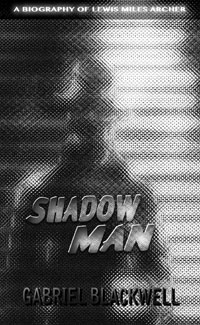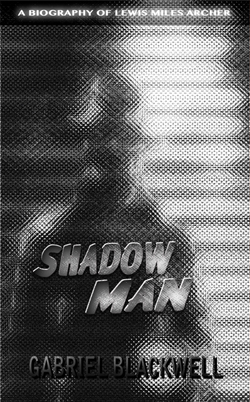The Natural Dissolution of Fleeting-Improvised Men by Gabriel Blackwell
 The Natural Dissolution of Fleeting-Improvised Men
The Natural Dissolution of Fleeting-Improvised Men
by Gabriel Blackwell
Civil Coping Mechanisms, Available October 2013
Gabriel Blackwell channels H.P. Lovecraft in The Natural Dissolution of Fleeting-Improvised Men, an epistolary metafiction that serves as part of a trilogy of works connected by his earlier Shadow Man and Critique of Pure Reason. In the introduction, Blackwell reveals that he has set out to Providence, Rhode Island, to find his girlfriend, Jessica, who disappeared while he was finishing the writing of Shadow Man. During that trek to Providence, he discovers the final letter of H.P. Lovecraft and that last message comprises most of the book in a footnoted poioumena intertwining his own desperate search with Lovecraft’s pestilential descent into madness. This isn’t just a pastiche of Lovecraft though, who died of intestinal cancer and whose last years were the most painfully productive. The mystery takes on a bizarre twist when he discovers the letter is addressed to another Gabriel Blackwell. Horror gets deconstructed and Lovecraft is retrofitted in a work that is less concerned with categorization than the ‘dissolution’ of existence. Experience itself becomes suspect as does the scholarship of pain. Blackwell, the meta character in the book versus the actual author, is typing out Lovecraft’s final letter. But as he does so, he is faced with a troubling revelation:
“That is, coming to the end of the particular sentence I was typing, I would look back over its analogue in the letter and would be unable to find even a third of what I had typed… This was undoubtedly made worse by the thicket of Lovecraft’s characters, by their lack of line breaks and paragraph breaks and even space between words, but it was also a quality of the prose. The events I was transcribing had not only not happened in life but not happened in the letter, either.”
It’s a setup for a mystery, a noir doused in elements of phantasmagoria with a magical lantern projecting Blackwell’s prose. The events described within are as gruesome and macabre as a Lovecraft story and in fact could be mistaken for one of his short stories. Horrible things are happening to the people in Lovecraft’s vicinity as in “this disgusting pile” that “was the remains of a man after he had been devoured and regurgitated by some horrid fungus or slime mold!” The grippe in his belly is devouring him from within and his mental state is corrupted into a decay and darkness that overwhelms his vision as much as his being:
“This thing in the basement was some sort of central node, a convergence of nerves. It was dowered with dark properties and obedient to dark laws; darkness was its element as air is the cloud’s, as water is the sea’s- the clashing, gnashing plates of its existence, in all of their horrifying splendor, were not so much dark as in aspect as of the dark…”
What adds a twist and requires a philological scalpel are the footnotes Blackwell uses to annotate his transcription of the letter. Much of the notes involves further elaboration of the plot details he outlines in his introduction. But there are disturbing intimations that require deciphering, a linguistic sonar to extrapolate from the echoes of meta-Blackwell’s journey. As his pursuit of Jessica becomes more desperate, his physical plight degenerates in a downward progression similar to Lovecraft’s. He is starving, cold, and suffering anemia. His body gets soaked with ink to the point where he does not recognize himself. With his impoverishment, things only get worse:
“I had a chronic inflammation around my anus- it itched all of the time and stung like a cut doused with hydrogen peroxide when wetted. I worried that I had soiled myself because of the wetness there, but always it was only blood.”
August 12th, 2013 / 11:00 am
I’m Not Saying, I’m Just Saying
 I’m Not Saying, I’m Just Saying
I’m Not Saying, I’m Just Saying
by Matthew Salesses
Civil Coping Mechanisms, February 2013
138 pages / $13.95 Buy from Amazon
Koi fish have hundreds of scales that form a protective armor around them. Matthew Salesses’s I’m Not Saying, I’m Just Saying is a collection of 115 flash fictions that, like those scales, explore the spoken and unspoken nuances that connect and glue relationships in all their misfit forms. Many of the characters go unnamed, a decision that suggests that the companions symbolize divergent desires. There’s the wifely woman who’s his main lover and there’s a “white woman” who acts as a mistress as well as another Korean woman who is in place “for emergencies.” Each serve a different need, though none can satisfy him because he partitions himself like the segmented chapters that comprise the book. They are lyrical segments akin to jazz solos forming a striking concerto of prose. The impetus that triggers the journey of the book is the appearance of a son he never knew he had. When the boy’s mother, an old lover, passes away, the narrator takes the son into his home. Rather than a definitive reaction to this revelation, there’s a miasma of conflicted emotion, an uncertainty that could best be summed up in the piece, “She Was a Tsunami to His Earthquake:”
His lovers, his co-workers, and finally, his son, form a tenuous thread that bind the invisible wavelengths of his life together. Only, he is always trying to split them apart and keep them isolated in a delicately stratified web. In describing the side girl-on-the-side, he says: “I had to be careful with her, though I wasn’t technically married, because she collected the crumbs of truth, but for an hour with her, I was someone else, and when I left, I could discard that part of me and know it would be repossessed.” The elegance of the book lies in the poetic congruence with which his life is shattered by circumstantial incongruence. Say, for example, his observation at an art gallery with his son that only the letter T separates the word “paint” from “pain.” This was an association formed from his failure to be the artist he aspired to be as a freshman in college. He is protecting himself from pain, but entering it willingly to try to teach his son something about painting. That contradiction of both being in the mural and trying to control it hints at the theme of a man all too aware of his foibles and flaws, but still is helpless to do anything about it. Twisted accents in his relationships add shades and make every interaction a layered strip tease, tantalizingly bare without showing anything essential:
May 17th, 2013 / 11:00 am
25 Points: The Prodigal
 The Prodigal
The Prodigal
by Alexander J. Allison
Civil Coping Mechanisms, 2013
194 pages/ $12 buy from Amazon
1.
2. Allison’s novel “The Prodigal” explores the nature of a man born with a silver spoon, his relationship to his parents, to school, to his best friend David and most importantly, to Poker. The protagonist’s name is Martin and you will follow him through a series physical, financial and existential crises in this portrait/cringe-theatre/road-trip/gambling novel.
3. In conjunction with reading this novel, I started playing online poker.
4. This is a very helpful companion to The Prodigal http://en.wikipedia.org/wiki/Glossary_of_poker_terms
5. Three structural features of the novel include:
a) varied text size. At times a word will or series of words will appear in large, irregular font to point out a particular emotion or event. I have seen Ben Brooks do this. Is it a British thing?
b) italicized asides like “Sad shadows saddows”. These are humorous plays on words or ideas hat break the text with an unpunctuated breath.
c) Flashback chapters which operate similar to Lost episodes, connective tissues are formed showing why Martin is fucked.
6. To start, I downloaded an App simply called “Poker” onto my Ipad. I started with 10,000 dollars. What endears one about the game is just how fucking simple it all seems at first. Each individual game consists of a few small choices. There is lying involved as well as the puffing-up of chests. This is a very inhuman way to play poker, it is fast-paced, difficult to read people, and deeply anti-social. There is no ‘chat’ feature in “Poker” and most of my opponents are faceless guests. My first day into “Poker” ended with a 45,000 dollar profit.
Diary note: This game is a joke. People who play it are morons/addicts.
Three days later, I would be swishing cuticle treads around in my mouth praying to god before the river of a shitty flop. I was hounded with insecurities and sleeplessness. Poker was no longer a joke but an insipid nightmare I continued to return to. I’d entered into the realm of pay-to-play online poker and my budget had been exhausted thrice over.
Diary note: I’ll do it for the novel.
7. Martin in a casino:
“This microcosm has its own language. It’s a living lexicon. The game’s language exists to keep some fools out and trap even bigger fools in You’ll have heard of donkeys and fish, but what of the rockets? What of the fishhooks and gay waiters? What of the suck and resuck, the gutshots and wraps and double bellybusters? What space is there for a beat jackpot? What is there left to be said of tilt? Who is durrrr to you? What’s an isildur1? How would you respond to OMGClayAiken? What is life before you’ve sharkscoped Spirit Rock, nanonoko, moorman1? This language is the soul of poker. Cards are but a blunt instrument. Cards are the messy, unpredictable side note to the sport. It is cards, however which force the drama of life.
Internally, Martin is humming the Pink Panther theme-tune. This makes him feel sneaky.”
8. On 7 alone you should read this book.
9. The book says much of what many books say about being 20 is like: the depressing vacancy one achieves when the last drop of innocence leaves you. But the metaphor of poker intermingled with this prodigal/rich kid presents the reader with the quandary of: how do I root for this guy? The path I took was not so much to root, but to sit down and enter Martin and ride from one catastrophe to another. The balance of sincerity and humor comes off sardonic, but the smiles feel earned and cringes unavoidable.
10. donk bet
1 A bet made by a donk, i.e. one that is generally considered weak or to demonstrate inexperience or lack of understanding of strategy.
2 A bet made in early position by a player who didn’t take initiative in the previous betting round. It was named because this move is often considered indicative of a weak player (since it is more often reasonable to expect a continuation bet). READ MORE >
April 16th, 2013 / 2:33 pm
GIVEAWAY: I’m Not Saying, I’m Just Saying

Last weekend, I invited Matthew Salesses to show up and rock out at this reading series in DC. The room was poorly lit, and the readers had to stand on a rickety wooden stage. The venue made the whole thing feel like we were at some sort of half-assed comedy show, but Matt and the other readers (Laura van den Berg, Dan Gutstein, and Sarah Burnett) were utterly incredible—especially considering that there was this obnoxious improv group stomping on the floor above us because they thought they were at basketball practice, or something.
Anyway, there’s nothing all that funny about Matthew’s new Book, I’m Not Saying, I’m Just Saying. At its surface, Matthew’s book is about the predicted failures and slow learning curve of a nameless new father. But deeper down, it explores how our actions and desires are intrinsically linked to our identities and our understanding of ourselves. I’m personally a big fan of Matthew’s terse, controlled prose, which almost always looks this beautiful:
I’m Not Saying is a short book with short chapters, but it’s worth reading slowly. I’m always inspired by how dutifully Matthew matches tone and subject matter in his writing, and there’s more than enough proof out there that I’m not the only one inspired by it.
But I’ll stop gushing and get to what’s important: Matthew has agreed to give away two signed copies of I’m Not Saying, I’m Just Saying. Quote the weirdest/funniest/strangest thing your father has ever said (and try to avoid being offensive) in the comments by Tuesday, March 5th and Matthew will pick two winners. Get’it’gurl.
“Shadow Man: A Biography of Lewis Miles Archer,” edited by Gabriel Blackwell
 Shadow Man: A Biography of Lewis Miles Archer
Shadow Man: A Biography of Lewis Miles Archer
Edited by Gabriel Blackwell
Civil Coping Mechanisms, October 2012
286 pages / $13.95 Buy from Civil Coping Mechanisms or Amazon
Is there a form called smart noir? There should be. In Shadow Man: A Biography of Lewis Miles Archer, published by Civil Coping Mechanisms, Gabriel Blackwell both conducts and writes the story. As the meta-writer and the meta-detective, he’s inside what happens, and outside, all at the same time. Blackwell claims, rather coyly, to be the “editor” of Shadow Man: A Biography of Lewis Miles Archer, and he is listed as such on the cover. But like a savvy gumshoe, Blackwell is too humble—and too sneaky—to list his skills upfront. His project is to blur lines between fiction and nonfiction; genre and form; noir and innovation.
We should consider ourselves forewarned meta-readers because Blackwell, as editor of this book, as author and researcher, is the ultimate shadow man. Blackwell disappears into the story and lets us know that he will be seen—and not seen:
We read to name that “pink elephant” in the room and, in the manner of noir, to find that missing femme fatale in the bar. The reader’s suspicious impulse might be to sit with the book and with Google, to search what is fiction, nonfiction, or imagination. We are inside the story as it unravels and outside the story as it is revealed. The story becomes confounding, like “a maze”:
I soon gave up the inter-textual Google approach to reading Blackwell and let myself be drawn into the cheeky editor’s devilish and impish fun. Those who are unseen and unknown are often the characters of literature that might reveal the most, were we to bother to ask. Blackwell bothers. He uses this knowledge, his questions, to great effect, illuminating a man who existed and didn’t exist, someone who disappeared with nary a backward glance.
February 15th, 2013 / 12:00 pm
Weston Cutter interviews Gabriel Blackwell
 I’m a huge admirer of Gabriel Blackwell — as prose editor at Noemi Press, I’m publishing his book of short fiction Critique of Pure Reason very soon, and I’ve published a piece of his body of work in almost every venue I’ve gotten my hands on. What I mean to say is that I can vouch for him as a writer and as a human being, and that you should also check out his novel Shadow Man, about which Weston Cutter has interviewed him. Here is Weston’s introduction, and their interview:
I’m a huge admirer of Gabriel Blackwell — as prose editor at Noemi Press, I’m publishing his book of short fiction Critique of Pure Reason very soon, and I’ve published a piece of his body of work in almost every venue I’ve gotten my hands on. What I mean to say is that I can vouch for him as a writer and as a human being, and that you should also check out his novel Shadow Man, about which Weston Cutter has interviewed him. Here is Weston’s introduction, and their interview:
Gabriel Blackwell’s Shadow Man: a Biography of Lewis Miles Archer arrived in black and white. I mean that both the galley copy was not full color, and that the book offers itself as a thing in or amidst a noirish fog, like some old cinematic masterpiece. Here’s how it starts: “Lewis Miles Archer, or anyhow the man known to creditors and clients as Lewis Miles Archer for just long enough to build up a respectable sheet of both, was born sometime between 1879 and 1888, somewhere in the shadow of Lake Michigan.” What Blackwell’s doing with this sort of dancing-away imprecision (four different states, for instance, could claim regions in the shadow of Lake Michigan) is crafting a slippery-but-detailed-as-possible biography of a fictional character. What actually happens to you as you read is you feel the line between ‘real’ and ‘fiction’ slipping, twisting and going porous in ways that, at least to this reader, become unsettling in fantastic ways: one less reads Shadow Man than goes into it and, later, comes out from it. It’s a hell of a thing. Gabe and I recently batted a single round of questions back and forth, hoping we’d get into more questions but then, after the first round, realizing 1) we’d gotten done what we’d hoped and 2) life intrudes.
Weston Cutter: Were there any rules in how you composed this book? In other words, did you keep 100% fidelity to the fictiveness of fiction and the ‘reality’ of reality? And how did this book end up taking the form it did? I guess mostly this question’s one rooted in fascination, one writer to another saying: how the fuck did you even find the trail that let you even begin to walk toward the result that is this book? How does one do that?
Gabriel Blackwell: I don’t think I thought of them as rules, but I guess they could be viewed that way—I created none of my characters and tried as much as possible to put the events from my texts (Raymond Chandler’s The Big Sleep, Dashiell Hammett’s The Maltese Falcon, and Ross Macdonald’s The Moving Target) into new contexts rather than invent other events to suit the narrative. But those didn’t seem like rules—I was just trying to write a book that worked in the way that I wanted this book to work. Shadow Man, which has to do with inheritance and imitation, needed to be a node rather than a terminal, a book that pointed outside of itself in constructive ways. I like lots of terminal fictions, books that assert that what they are describing is to be believed for the duration of their story and no further, books that begin and end inside the author’s head. But it’s rare that I’m actually caught up in those books; I’m always conscious of the writer playing house with me. That tends to take me out of it. I don’t want to read a transcript of someone playing with paper dolls, not if it isn’t really compelling. READ MORE >
Ana Carrete’s “Baby Babe”
I want to trumpet the arrival of Ana Carrete‘s debut book of poetry and drawings, Baby Babe, published by Civil Coping Mechanisms next month.
What to expect? Ana’s poetry plays with words. Her poems play with themselves. That sexual double-entendre is appropriate and typical of her work. The word “come” is always euphemistic in Ana’s poetry. Sex is on the brain, and the brain is a clever, punning, playing one, with a wry sense of humor. The twenty-five-year-old girl-woman who writes these poems is rarely without her sense of humor, even when it’s grim.
October 16th, 2012 / 10:06 pm
The Sky Conducting
 The Sky Conducting
The Sky Conducting
by Michael J. Seidlinger
Civil Coping Mechanisms, 2012
308 pages / $14.95 buy from SPD
Rating: 8.2
The Sky Conducting is what post-apocalyptic America will look like. There won’t be as much bloodshed as some of the ‘gore-mongers’ would like. Don’t bother saving all those containers of spam. They aren’t going to prepare you for the overwhelming emotion. READ MORE >
May 16th, 2012 / 12:00 pm
The rad novel Fires, by Nick Antosca, has just been rereleased by Civil Coping Mechanisms. It’s also packed with a few short stories, including a short story that is actually uncomfortably sexy: The Girlfriend Game.

